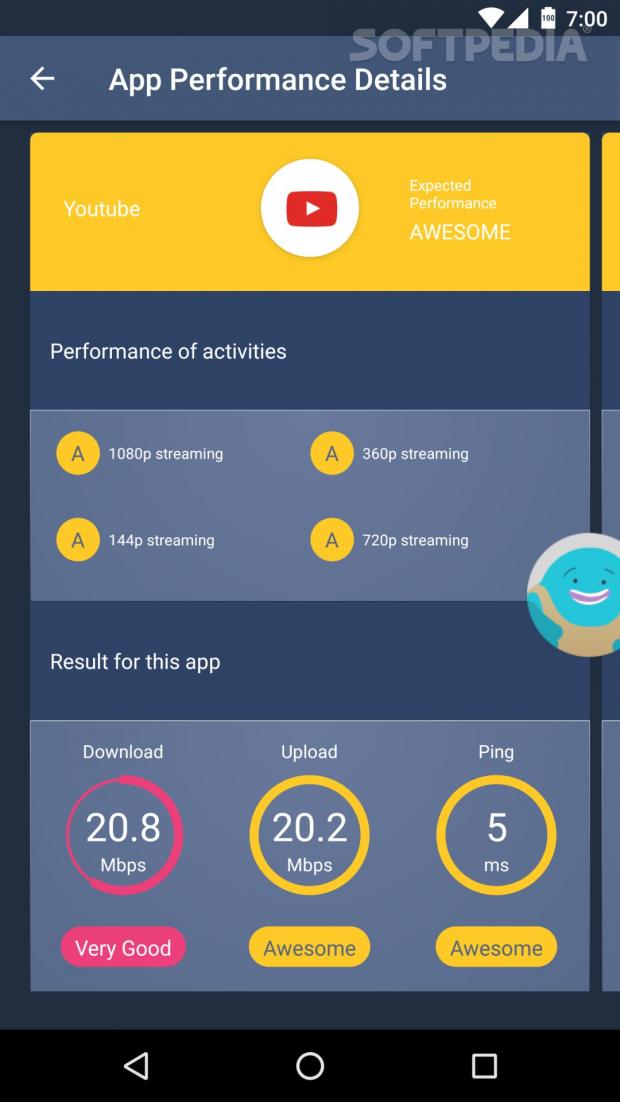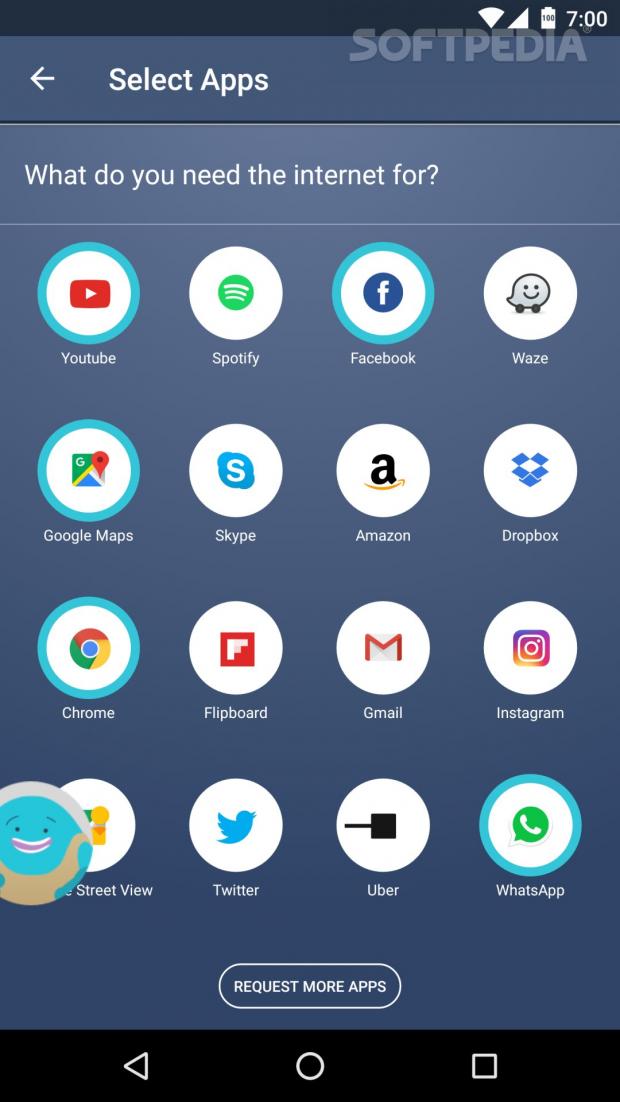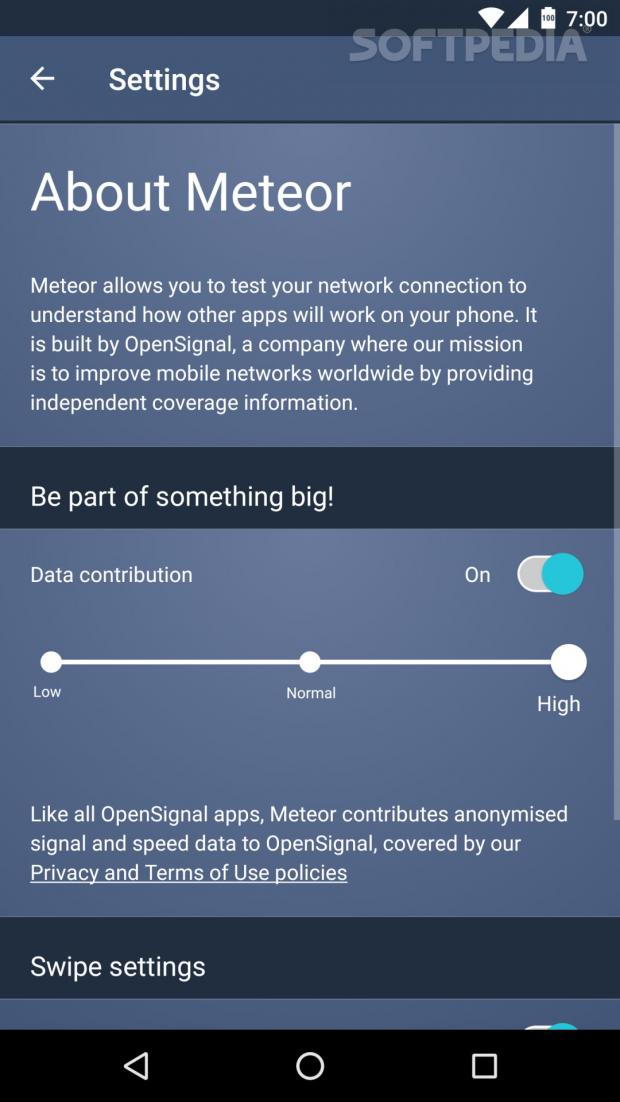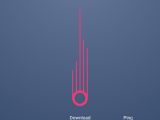The new Meteor app from OpenSignal feels like the friendliest and efficient tool people can use to figure out the real speed of their Internet connection.
The developers from OpenSignal are well known for their extremely well-built applications such as the “3G 4G WiFi Maps & Speed Test” and “WiFiMapper.” Sure, they could have come up with some better names for their apps, but that’s less relevant when the software they create is that good.
It’s also true that OpenSignal’s primary application, “3G 4G WiFi Maps & Speed Test” (they really need a good name for this one), also comes with a testing function, but it’s superficial at best. It provides relevant numbers, but it doesn’t go beyond that. This is where the Meteor app comes into play.
How it works
You might wonder why Meteor is better or at least different from all the other similar solutions that people have tried, and you would be right to do so. The problem with apps that test the speed of your Internet connection is that they are not accurate, and that’s true for other platforms, not just Android.
There are two issues that need to be addressed. First of all, the test itself is skewed because it uses an optimized algorithm for that testing procedure, and that’s just ridiculous if you think about it. Most applications that use the Internet connection on a mobile device, through mobile data or Wi-Fi, are not always optimized in this regard.
Then there is the second problem, and that’s the server used for testing. Other apps usually choose the fastest or the closest server available for that connection. It might look really nice when the test results come back, but that won’t be relevant to users in any way. Most of the servers you’re going to interact with are across the world and don’t respond with the same speed.
If we add to these two issues that some of the other competing applications commonly used to test the connection speed partner up with certain Internet providers, then the image becomes a lot clearer. The fact is that it’s difficult to put your trust into an app that only offers numbers for an ideal situation, and that might not be representative of daily usage.
Furthermore, if the application you're using displays only the peaks and the low speeds, that's not all that useful to the users. There is almost no value to know that you can get X amount of MB of data per second if you don't have the same experience in real life.
Usage
The idea behind the Meteor application is really simple, and that is to offer the most realistic results possible. As I mentioned above, having best case scenario tests is not all that relevant, so a different approach is needed.
Meteor tests your Internet connection, either through Wi-fi or just mobile data, by using some of the most popular online services. This means that it's not picking the closest server to you; it's getting the proper server for each service tested.
For example, you might be an avid user of Google Chrome, so you will need to see what's the Internet speed with that app. Most likely, the performance of your connection will differ from Facebook to Whatsapp.
Of course, the Meteor users will also receive the general performance values with average latency, but knowing how a particular service is behaving in relation to you is just as important. The goal of Meteor is achieved by pinging and sending real data to the servers used by each of the implemented apps, thus offering much better metrics.
There are quite a few apps that can be tested for with Meteor, and you don't need to have them installed on the phone. Right now, the tests available in Meteor include YouTube, Spotify, Facebook, Waze, Google Maps, Skype, Amazon, Dropbox, Google Chrome, Flipboard, Gmail, Instagram, Google Street View, Twitter, Uber, and WhatsApp.
It's not the final list and people can request to have new apps included in Meteor. As you can see, pretty much all of the most used apps are available, and they should be enough for the majority of users.
Meteor allows for five apps selected simultaneously for each test, so you won't be able to test them all at once. It would most likely put a strain on the servers, but choosing just five seems to be enough. Also, the tests don't take that long, and you can rapidly select another five and run another test.
The provided results are for Download, Upload, and Ping, both for the overall performance and for each app that you've tested for. In the main tab, the results are shown only for the overall Internet performance, and you will have to tap on each app to learn more details about a particular test.
Another two tabs are available in Meteor, and they are called Dashboard and History. The Dashboard has information regarding the number of tests, the location of each test, and a filter to see the best and worse outcomes.
It's easy to imagine what the History tab is for, as it offers a list for all of the previous tests that have been performed since the app was installed.
It's completely free
Unlike other applications on Android that test the speed of the Internet connection, Meteor is completely free, and in this case, it's not an exaggeration. There are no ads and users are not required to pay a fee to unlock some more advanced features. What you see is what you get.
There is one important aspect that users must know about. By default, the option to gather and send anonymous data back to OpenSignal is set to On. How much data you send can be dialed back or turned off completely, but people must know about this aspect.
OpenSignal has been gathering this type of data from its apps for years, and the efforts of the community allowed them to compile very comprehensive maps with Internet speeds from all around the world.
Conclusion
Fortunately for the Android users, Meteor it's not only excellent at measuring the performance of your Internet connection but also doing that in a relevant way for users.
There are only a couple of small issues with the app. The fact that it's limited to just five apps per test might be considered a problem by some users. Also, a few major apps from the Android ecosystem are missing from the selection. I'm sure that many people would want to see how good their streaming speed for Netflix is, and that's just one example.
All in all, Meteor is the almost perfect choice if you want an application that is both great at what it does and completely free. If you don't like that it gathers and sends anonymous data, you can always shut that feature off, although it's a small issue and, in the end, that data is used for useful maps that are also offered completely free on their official website.
You can download the latest version of Meteor from Softpedia. If you don't know how to install an APK file, we also prepared a tutorial.
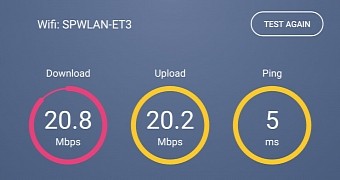
 14 DAY TRIAL //
14 DAY TRIAL // 